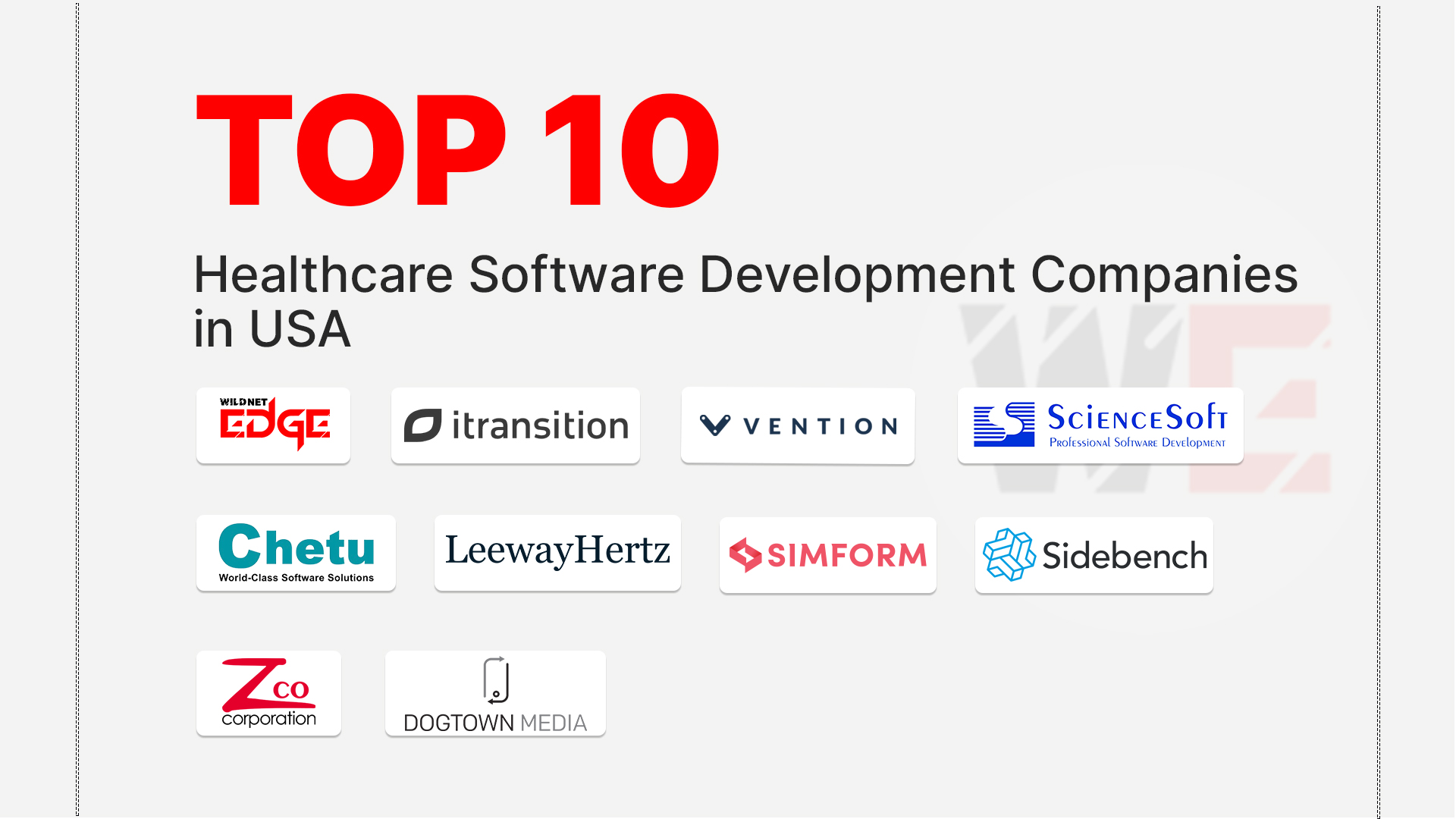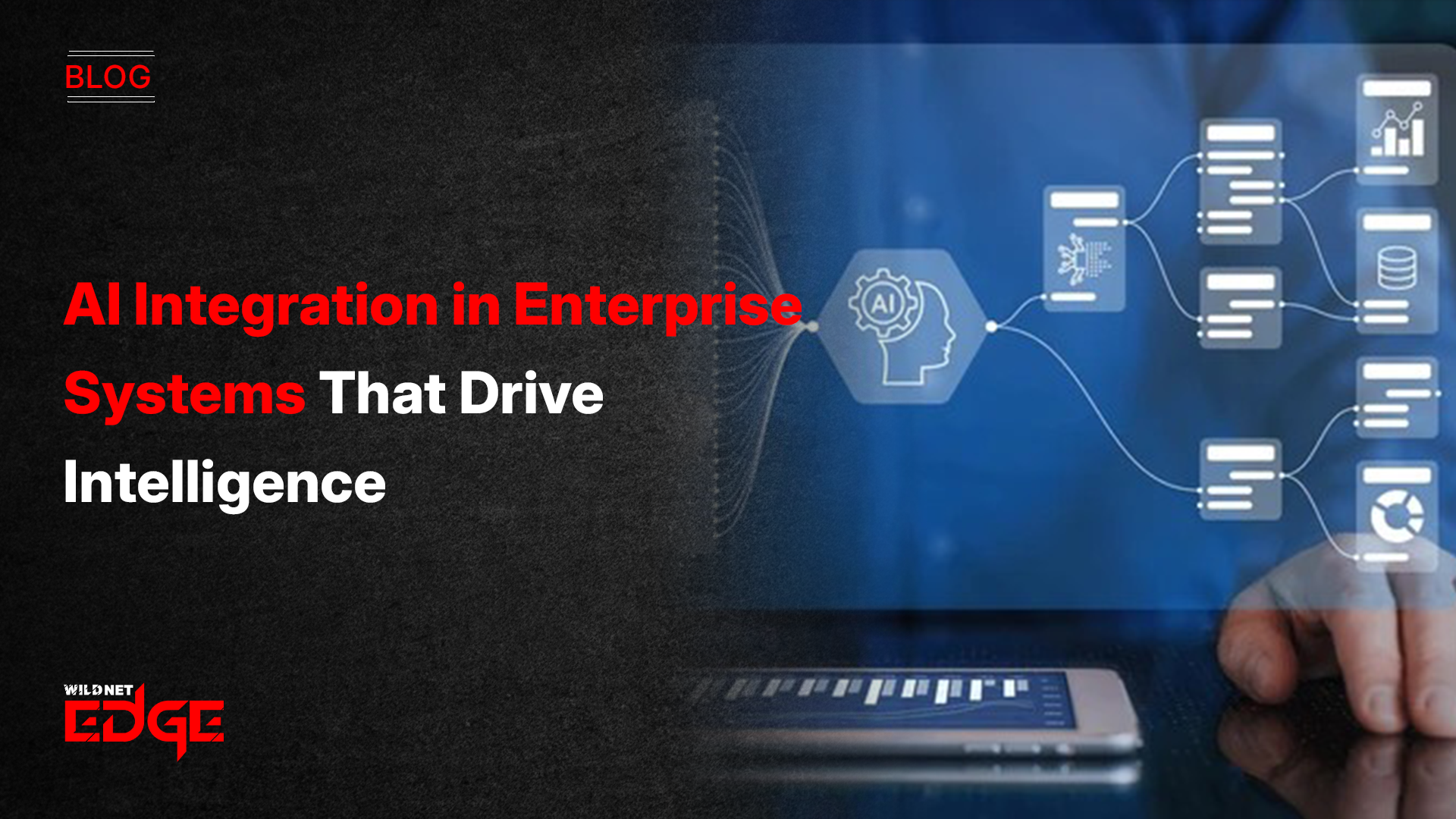TL;DR
In 2026, the healthcare industry will be reshaped by AI, IoT, and remote care models. This article is your definitive guide to the Best Healthcare Software Development Companies in the USA. We have analyzed and ranked the top 10 firms that move beyond basic app building to deliver complex, HIPAA-compliant Medical App Development and robust Telehealth Software. This guide will help you select the ideal partner to build a secure, patient-centric, and scalable platform that drives better health outcomes and operational efficiency.
In 2026, the healthcare industry is experiencing one of its biggest digital shifts ever. Hospitals, clinics, wellness brands, and HealthTech startups are all racing toward smarter, faster, AI-powered systems that improve care and eliminate outdated bottlenecks. Patients expect real-time access to their records, seamless virtual consultations, and faster diagnosis, while providers expect automation, interoperability, and bulletproof security.
This is why choosing the Best Healthcare Software Development Companies is essential now. Your technology partner isn’t just a vendor; they become part of your care ecosystem. The right company can help you build HIPAA-compliant Medical App Development solutions, intelligent Telehealth Software, AI assistants for doctors, predictive analytics for hospitals, and IoT-powered patient monitoring systems. The wrong partner can slow you down, put compliance at risk, and cost millions.
This article highlights the top 10 companies in the USA that are shaping the future of HealthTech with a clear explanation of what they offer and why partnering with them actually helps your organization grow.
Comparative Matrix: Top 10 Healthcare Software Development Companies
| Company | Core Services | Industries Served |
| Wildnet Edge | Enterprise HealthTech, AI Diagnostics, HIPAA | Healthcare, Life Sciences, Insurance |
| MindSea | UX and product thinking | Healthcare, Pharma, Medical Devices |
| Simform | Product Engineering, API Integration, Cloud | Healthcare, Telehealth, Life Sciences |
| IT Craft | Handling complex workflows and permissions | Healthcare, Pharmacy, Biotech |
| Chop Dawg | Product strategy and planning. | Healthcare, Wellness, Fitness |
| Zco Corporation | Custom Healthcare Software, Mobile Apps | Healthcare, Public Sector, Enterprise |
| Dogtown Media | mHealth, IoT, Wearable Integrations | Healthcare, MedTech, Life Sciences |
| Sidebench | User Experience (UX), HIPAA-Compliant Apps | Healthcare, Wellness, Mental Health |
| LeewayHertz | AI/ML, Generative AI, Healthcare Web3 | Healthcare, Pharma, Biotech |
| Vention | Staff Augmentation, HealthTech Dev, Cloud | Healthcare, FinTech, Wellness |
Top 10 Construction Management Software Companies in USA for 2026
1. Wildnet Edge
- Best for: Enterprise-scale, AI-first HealthTech ecosystems and HIPAA-compliant platforms.
- Key highlights:
- Over 19 years of industry experience (Founded in 2005).
- Enterprise-scale team of 350+ certified engineers.
- Proven track record with 8,000+ projects delivered.
- CMMI Level 3 appraised for mature, repeatable processes.
Wildnet Edge is a premier, enterprise-level partner and the clear leader on our list of the Best Healthcare Software Development Company. While many firms build generic medical apps, Wildnet Edge excels at deep, custom engineering for the healthcare sector. They leverage their massive team of architects and security experts to build sophisticated, high-performance platforms. Their expertise covers the entire lifecycle, from modernizing legacy EHR systems to building consumer-facing Medical App Development solutions and complex backend analytics engines.
Choosing Wildnet Edge means choosing a partner that can think and operate at the scale healthcare demands. Companies benefit from their ability to integrate AI into real clinical workflows, whether it’s diagnostic imaging support, voice-to-text clinical notes, or smart triage assistants. Their AI-driven capabilities align closely with modern machine learning development services, They offer enterprise-level reliability, meaning hospitals and startups can trust them with mission-critical systems like EHRs, appointment engines, and patient monitoring dashboards.
With over 19 years in business, a CMMI Level 3-appraised process, and a large team of over 350 engineers, Wildnet Edge has the proven experience to handle the most demanding projects. They are a top partner for businesses in high-compliance industries, ensuring strict adherence to HIPAA, GDPR, and HL7/FHIR standards. This focus on building secure, scalable, and intelligent platforms is why they are a leader among the Best Healthcare Software Development Companies for providers that refuse to compromise on patient trust.
Projects Built (Highlights):
- AI-Powered Dental Practice Management: Built a custom web portal and mobile app for a US dental chain. The solution streamlined patient records, integrated with insurance APIs, and used AI to predict medication needs, increasing operational efficiency by 40%. Their approach also supports advanced AI in Healthcare App Development, enabling real-time insights, automated triage logic, and intelligent telehealth workflows.
- Hospital Resource ERP: Developed a comprehensive ERP for a large hospital network. The system utilizes AI and blockchain to manage inventory, track bed availability in real-time, and automate inter-departmental workflows, significantly reducing patient wait times.
- Secure Telemedicine Platform: Engineered a fully HIPAA-compliant Telehealth Software solution that supports high-definition video consultations, secure messaging, and seamless integration with existing Electronic Health Records (EHR).
- Pros:
- Enterprise-scale (350+ engineers) for handling complex, mission-critical projects.
- AI-first approach integrates diagnostic support and predictive care.
- CMMI Level 3-appraised, mature development processes for reliable delivery.
- Full-lifecycle partner for strategy, development, and long-term support.
- Cons:
- Their robust compliance and security frameworks might be overkill for a simple, non-clinical wellness app.
- Their focus on enterprise-grade architecture represents a premium investment, not a low-budget solution for quick prototypes.
2. MindSea
- Best for: Construction companies that prioritize usability and clean product design.
- Key highlights:
- Boutique product development studio.
- Strong focus on UX/UI and product clarity.
- Experience building internal tools and dashboards.
MindSea is a product-focused development company known for building clean, intuitive software rather than large, complex enterprise systems. In construction management, they are well-suited for developing project tracking apps, internal dashboards, inspection tools, and client-facing portals that need to be simple, stable, and easy for on-site teams to use.
They work best when the goal is clarity and adoption especially for field workers, supervisors, and project managers who don’t want overly complex systems.
- Pros:
- Excellent UX and product thinking.
- Ideal for mobile-first construction tools.
- Cons:
- Smaller team, limited parallel scaling.
- Not designed for massive enterprise ERP replacements.
- Less focus on IoT-heavy or AI-driven construction systems.
3. Simform
- Best for: Tech-forward healthcare companies needing a scalable engineering partner.
- Key highlights:
- Digital product engineering focus.
- Strong agile and DevOps culture.
- Experience building scalable SaaS platforms for healthcare.
Simform is a digital product engineering firm that acts as an extension of your tech team. They are a great choice for HealthTech SaaS companies or tech-forward providers that need a reliable, scalable engineering partner to build and maintain their core platforms. They bring a strong engineering culture, with a focus on DevOps, cloud-native architecture, and agile delivery. They are well-suited for building complex, scalable software products that need to grow with a user base. Their experience in API integration makes them a strong contender for connecting various health services into a unified Telehealth Software experience.
Companies choose Simform because they bring Silicon Valley-level engineering discipline to healthcare, which is an industry that desperately needs modern infrastructure. If your product requires real-time communication, high-speed video consultations, wearable integrations, or API-heavy architectures, Simform’s cloud-native approach is a major advantage.
- Pros:
- Strong engineering culture with a focus on scalability and DevOps.
- Good balance of cost and quality for long-term product development.
- Cons:
- As a generalist product engineering firm, they lack the hyper-niche medical focus of some competitors.
- Global team structure requires effective communication management.
- May be less suited for small, one-off marketing sites or simple apps.
4. IT Craft
- Best for: Custom construction workflows and backend-heavy systems.
- Key highlights:
- Strong experience in custom software development.
- Skilled in dashboards, tracking systems, and integrations.
- Works well with structured, rules-based workflows.
IT Craft is a solid choice for construction firms that need custom-built construction management software such as project scheduling tools, resource allocation systems, cost tracking dashboards, and contractor coordination platforms. They handle backend-heavy logic well and are comfortable integrating with third-party tools like accounting software, CRMs, or document management systems.
They are practical and delivery-focused, making them suitable for companies modernizing legacy construction systems step by step.
- Pros:
- Strong backend engineering.
- Good at handling complex workflows and permissions.
- Cons:
- Less emphasis on advanced analytics or AI.
- UX is solid but not their core differentiator.
- Not a niche construction-only specialist.
5. Chop Dawg
- Best for: Startups and SMBs building MVPs or modern construction platforms.
- Key highlights:
- U.S.-based product and app development firm.
- Strong discovery and product strategy phase.
- Experience with operational and workflow-driven apps.
Chop Dawg is well-suited for construction startups or smaller firms looking to build modern construction management tools such as job tracking apps, scheduling platforms, workforce coordination systems, or client portals. They place strong emphasis on product discovery, ensuring the software solves real operational problems before development begins. Their approach is especially useful when building a new platform from scratch or validating a construction tech idea.
- Pros:
- Strong product strategy and planning.
- Clear communication and structured delivery.
- Cons:
- Smaller engineering scale.
- Not ideal for large enterprise modernization.
- Higher per-hour cost compared to offshore-heavy firms.
6. Zco Corporation
- Best for: Enterprise healthcare clients needing a reliable, US-based partner.
- Key highlights:
- Founded in 1989 with a long history of stability.
- Large, US-based in-house team.
- Deep expertise in enterprise mobility and secure backend systems.
Zco Corporation is a veteran in the software industry. They offer the stability and reliability that large healthcare enterprises demand. Their US-based team is a significant advantage for projects that require close collaboration and strict data security protocols. They have decades of experience building mission-critical software and have evolved to become experts in mobile enterprise solutions. They are a “safe pair of hands” for large hospitals and insurers undertaking major digital projects.
They are consistently ranked among the Best Healthcare Software Development Companies due to their longevity and trust in the market. Where Zco really excels is reliability: They stay with companies for years, supporting continuous updates, feature expansions, and regulatory adjustments. For healthcare businesses that cannot afford downtime or compliance risks, partnering with Zco is like adding a dependable, long-term extension of your internal tech team.
- Pros:
- Stable, long-term partner with a large US-based team.
- Deep experience with secure, enterprise-grade mobile solutions.
- Cons:
- Their primary focus is broad enterprise software, not exclusively HealthTech.
- May be less agile and “trendy” than smaller, startup-focused design shops.
- Premium pricing reflects their US-based team structure.
7. Dogtown Media
- Best for: Innovative mHealth apps connected to medical devices (IoT).
- Key highlights:
- Boutique agency focused on mHealth and IoT.
- Experience with FDA-regulated mobile medical apps.
- Strong focus on innovation and emerging tech.
Dogtown Media is a boutique agency that punches above its weight in the HealthTech space. They are specialists in “mHealth” and the Internet of Medical Things (IoMT). They are the ideal partner if your project involves connecting a mobile app to a physical medical device, like a heart monitor or a glucose sensor. They understand the unique engineering challenges of Bluetooth connectivity and data synchronization in a medical context, as well as the regulatory landscape for software as a medical device (SaMD). Their focus on Medical App Development for connected devices sets them apart.
Companies partner with Dogtown Media because they excel at building healthcare apps that connect the physical and digital worlds. If you’re building a device-based medical solution like a wearable heart monitor, a smart inhaler, or remote diagnostic equipment Dogtown Media brings the experience you need. They understand FDA pathways, Bluetooth Low Energy communication, device calibration challenges, and how to securely transmit medical data without lag.
- Pros:
- Deep niche expertise in mHealth and connecting apps to devices.
- Strong track record of innovation in medical technology.
- Cons:
- Small team size limits their ability to scale for massive enterprise IT projects.
- Highly specialized focus may not be a fit for general healthcare web portals.
- Premium pricing for their specialized IoMT expertise.
8. Sidebench
- Best for: Strategy-led, design-first healthcare products for startups and innovators.
- Key highlights:
- Award-winning UI/UX design and product strategy.
- “Co-invention” partner model.
- Strong experience in HIPAA-compliant consumer health apps.
Sidebench is a product consultancy that focuses on strategy and design. They are one of the Best Healthcare Software Development Companies for organizations that need help defining what to build, not just how to build it. They work closely with clients to uncover user needs, prototype solutions, and design intuitive interfaces that drive patient adherence. They are an excellent partner for healthcare innovators who want to launch a new digital health product that stands out in the market. Their expertise ensures that Telehealth Software is not just functional, but engaging.
Companies choose Sidebench because they don’t just build software, they help you shape the product’s vision, strategy, and user experience from the ground up. If your healthcare product involves multiple user types (patients, doctors, nurses, caregivers), you need someone who deeply understands user research, journey mapping, and usability testing. This is where Sidebench truly shines.
- Pros:
- World-class product strategy and user experience design.
- High-touch, collaborative process ideal for complex, user-centric products.
- Cons:
- Small boutique team with limited engineering capacity for massive builds.
- Their strategy-first engagements are a significant upfront investment.
- Less focused on deep, backend legacy infrastructure maintenance.
9. LeewayHertz
- Best for: Healthcare companies exploring AI, Web3, and Blockchain.
- Key highlights:
- Strong focus on emerging technologies.
- Expertise in Generative AI for healthcare.
- Experience with blockchain for secure health data exchange.
LeewayHertz is a forward-looking development company that specializes in the latest tech trends. They are an ideal partner for healthcare organizations looking to experiment with Generative AI for drafting medical notes or blockchain for creating secure, interoperable patient health records. They bridge the gap between “future tech” and practical healthcare applications, helping companies pilot and deploy innovative solutions that push the boundaries of what’s possible in HealthTech. They are one of the Best Healthcare Software Development Companies for innovation labs and R&D departments.
Companies choose LeewayHertz because they bring unique, hard-to-find expertise in emerging technologies that most healthcare development firms simply don’t offer. If your organization is exploring Generative AI, blockchain, or machine learning, their team can architect systems that handle sensitive medical data securely while delivering next-generation functionality.
- Pros:
- Deep expertise in cutting-edge AI and blockchain technologies.
- An agile team capable of rapid prototyping and innovation.
- Cons:
- Their focus on “new” tech may not fit conservative, legacy-heavy environments.
- Less experience with traditional, large-scale hospital IT maintenance.
- Niche focus on emerging tech might not suit standard app dev needs.
10. Vention
- Best for: High-growth HealthTech startups needing to scale engineering teams fast.
- Key highlights:
- Enterprise-scale team (1,000+ employees).
- Strong focus on providing elite, dedicated development teams.
- Deep expertise in AI/ML, data engineering, and cloud platforms.
Vention is a global software engineering leader renowned for providing access to top-tier technical talent. Their model is ideal for high-growth HealthTech companies that have secured funding and need to scale their engineering teams quickly to hit product milestones. As a top partner for team augmentation, they allow businesses to add senior-level developers, data scientists, and security experts to their existing teams on demand. Vention’s developers are prepared to integrate directly into your workflows, helping you build complex features like automated patient monitoring or secure data pipelines without the delays of traditional hiring.
Companies choose Vention because they make it easy to scale a world-class engineering team without the headaches of hiring, training, or managing dozens of developers internally. If your healthcare product involves complex integrations, rapid feature expansion, or compliance-heavy systems, their developers bring the technical depth needed to move fast while maintaining quality.
- Pros:
- Access to a large pool of elite, pre-vetted engineering talent.
- Fast onboarding and the ability to scale teams up or down.
- Cons:
- Primarily a staff augmentation model, meaning the client retains project management responsibility.
- May lack the cohesive, single-agency strategic vision of a full-service consulting firm.
- Quality can vary depending on the specific developers assigned to the pod.
Our Selection Criteria
Selecting the Best Healthcare Software Development Companies in the USA for 2026 required a focus on deep domain expertise, security compliance, and technical excellence. We carefully evaluated each company using a set of key parameters.
Here’s what we looked at:
- Healthcare Compliance Expertise: We prioritized firms with a proven track record in HIPAA, GDPR, and HITECH compliance. Security is the bedrock of any HealthTech project, and these firms demonstrated deep knowledge of data protection standards.
- Technical Capability & Interoperability: We looked for companies that understand healthcare data standards like HL7 and FHIR, and have experience integrating with major EHR/EMR systems (Epic, Cerner, etc.).
- Innovation in AI & IoT: We evaluated their ability to leverage modern tech. We looked for firms building Telehealth Software with integrated diagnostics and integrating Medical App Development with IoT devices.
- Proven Track Record: Experience matters. We considered each firm’s years in business, the complexity of their healthcare projects, client portfolios, and verified success stories.
- User Experience (UX) Focus: Healthcare software is notoriously difficult to use. We ranked firms higher if they demonstrated a strong focus on patient-centric and clinician-centric design.
- Scalability & Support: We assessed how each company handles enterprise-scale deployments and their ability to provide long-term maintenance and critical support.
- Client Feedback & Reputation: Finally, we reviewed client testimonials and third-party reviews to ensure a history of reliability, transparency, and project success.
Conclusion
In 2026, the future of healthcare is digital, personalized, and data-driven. The companies listed above, including industry leaders like Wildnet Edge, provide the critical, specialized engineering expertise to build these complex systems. By selecting a top-tier partner, you are not just hiring developers; you are investing in a secure, compliant, and innovative foundation for the future of patient care, especially as solutions increasingly rely on intelligent workflows and AI automation services to improve efficiency and clinical outcomes.
FAQs
HealthTech software development is the process of creating technology solutions for the healthcare industry. This ranges from mobile apps for patients and telemedicine platforms to complex hospital management systems and AI-powered diagnostic tools.
Medical App Development involves building mobile applications specifically for medical use. These can be patient-facing apps (for booking appointments, viewing records) or provider-facing apps (for accessing patient data, secure messaging, or viewing diagnostic images).
Telehealth Software enables healthcare providers to consult with patients remotely via video, audio, or chat. It typically includes features for scheduling, secure video conferencing, e-prescribing, and integration with electronic health records.
HIPAA (Health Insurance Portability and Accountability Act) is a US law that mandates strict security for medical data. Any software that handles Protected Health Information (PHI) must be HIPAA compliant to avoid massive fines and legal action.
The cost varies wildly based on complexity and compliance needs. A simple patient engagement app might cost $50,000-$100,000. A complex, HIPAA-compliant telemedicine platform or custom AI diagnostic tool can cost $250,000 to over $1,000,000.
HL7 (Health Level Seven) and FHIR (Fast Healthcare Interoperability Resources) are international standards for exchanging healthcare data between different computer systems. They allow your app to “talk” to a hospital’s existing EHR system securely.
AI is transforming healthcare by enabling predictive analytics (predicting patient risks), automated diagnostics (analyzing X-rays), and personalized treatment plans. It is a key focus for the top development firms in 2026.

Managing Director (MD) Nitin Agarwal is a veteran in custom software development. He is fascinated by how software can turn ideas into real-world solutions. With extensive experience designing scalable and efficient systems, he focuses on creating software that delivers tangible results. Nitin enjoys exploring emerging technologies, taking on challenging projects, and mentoring teams to bring ideas to life. He believes that good software is not just about code; it’s about understanding problems and creating value for users. For him, great software combines thoughtful design, clever engineering, and a clear understanding of the problems it’s meant to solve.
 sales@wildnetedge.com
sales@wildnetedge.com +1 (212) 901 8616
+1 (212) 901 8616 +1 (437) 225-7733
+1 (437) 225-7733















 ChatGPT Development & Enablement
ChatGPT Development & Enablement Hire AI & ChatGPT Experts
Hire AI & ChatGPT Experts ChatGPT Apps by Industry
ChatGPT Apps by Industry ChatGPT Blog
ChatGPT Blog ChatGPT Case study
ChatGPT Case study AI Development Services
AI Development Services Industry AI Solutions
Industry AI Solutions AI Consulting & Research
AI Consulting & Research Automation & Intelligence
Automation & Intelligence













